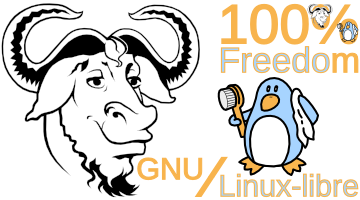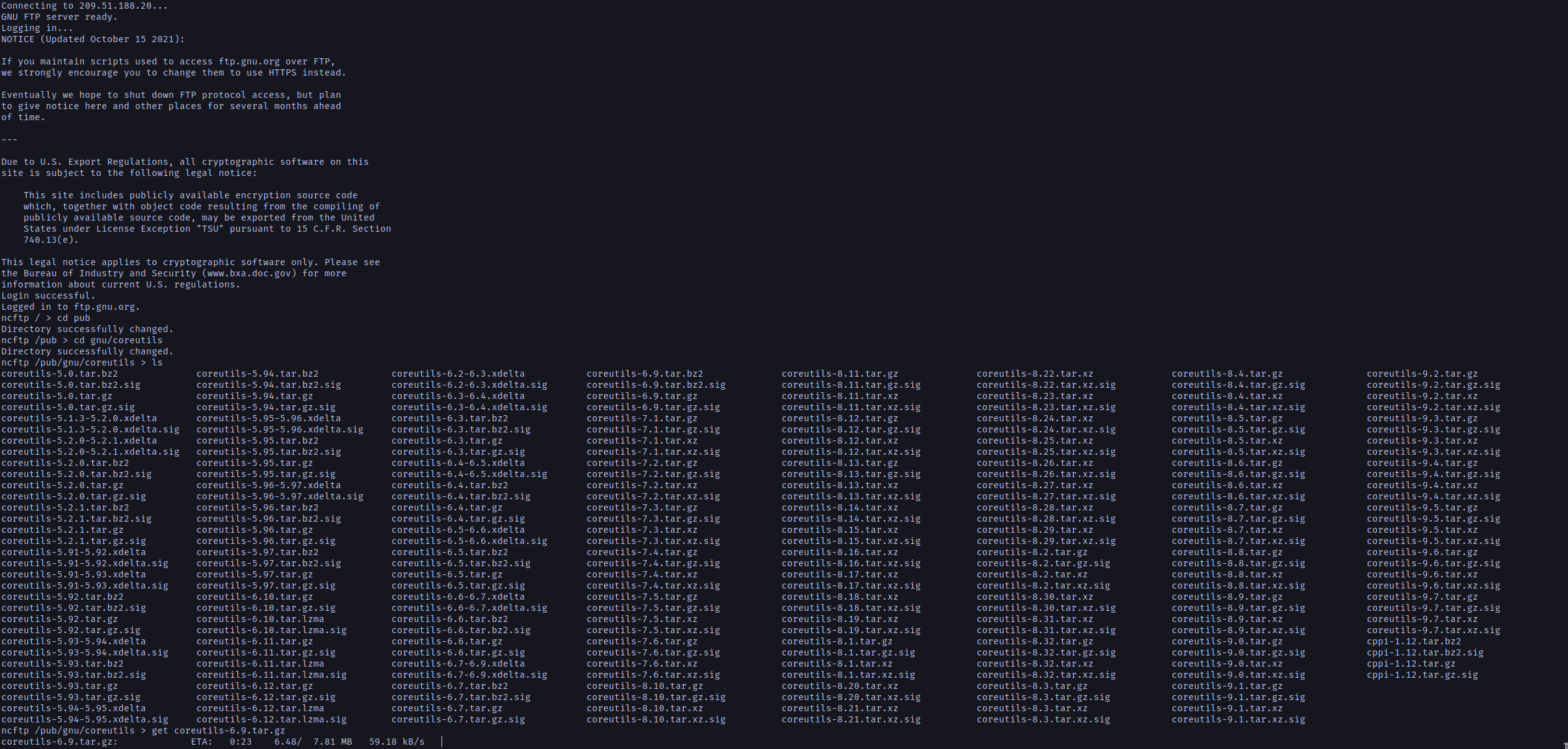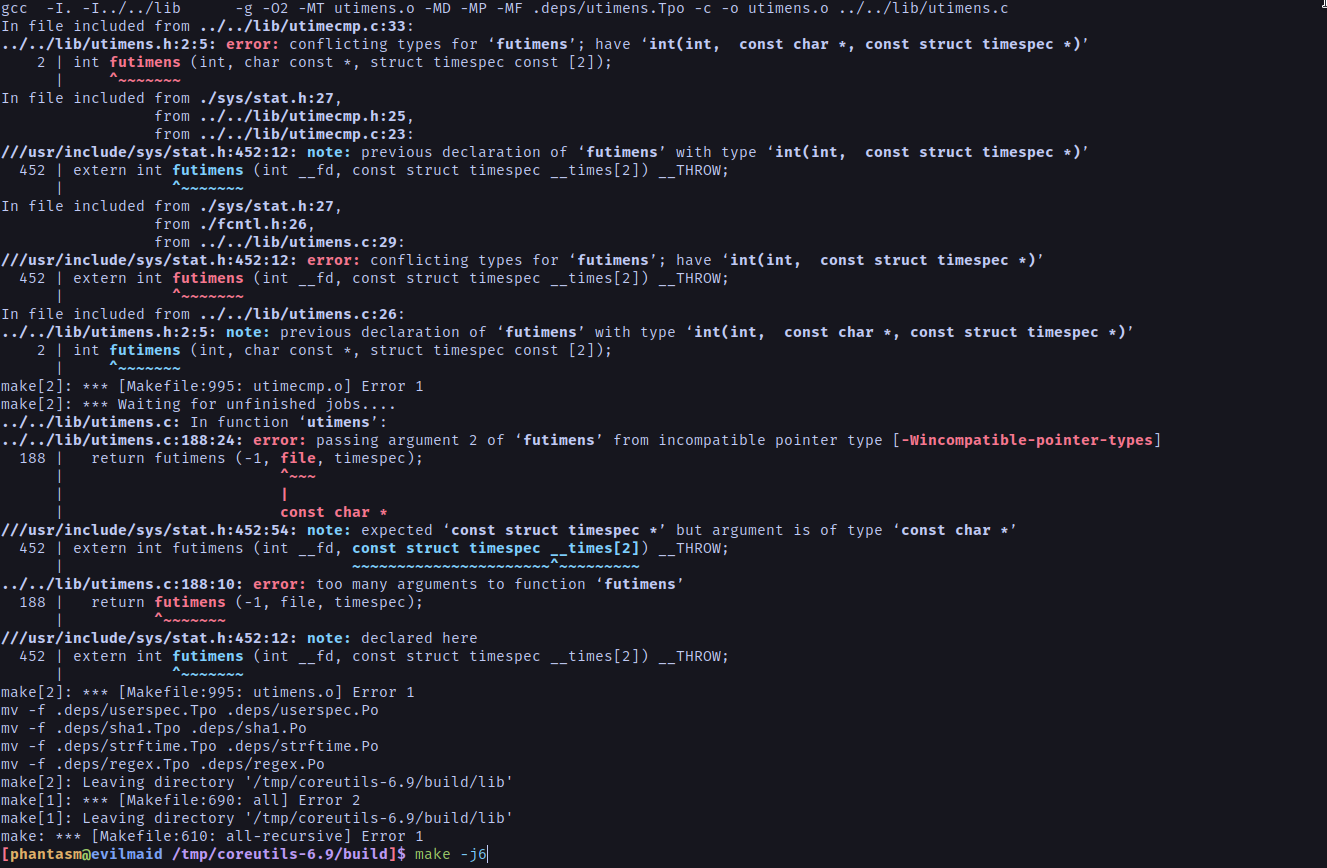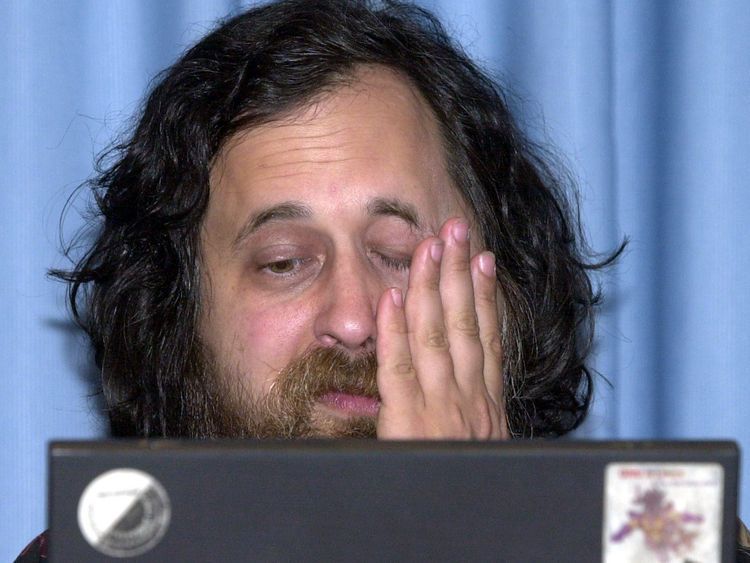Then the only option is 100% free software, as the proprietary masters will force you to subject to their will otherwise.
@sam@froth.zone Hot take: He's done more bad than good for free software
He was the last true MIT hacker and he carried forward the freedom of free software when it was poised to be eliminated, with the founding of GNU.
@Suiseiseki@freesoftwareextremist.com I don't read loser CIA Glowies
if your selling point of your software is just "it's free!", there isn't much else good to say about it, most likely
Every day there is more free software, but at the same time, every day it gets harder to avoid proprietary software.
@Suiseiseki@freesoftwareextremist.com great take: I have done more for free software by doing nothing than you will ever do
There is not really any other good term - there is libre, which have the same meaning, but many people don't recognize that.
So what term do you suggest?
Just because most people can't exercise freedoms 1 & 3 doesn't mean that they don't deserve them and that they will never want to do so.
https://www.gnu.org/philosophy/free-sw.en.html#four-freedoms
https://www.gnu.org/philosophy/open-source-misses-the-point.html
https://abhas.io/open-source-still-misses-the-point/
"Open source intelligence" has been around for much longer and the only natural meaning of "open source software" is clearly "software you can get the source code of", which falls short of the 4 freedoms; https://www.gnu.org/philosophy/free-sw.en.html#four-freedoms
There is the "open source definition", but most "open source" supporters have *never* seen that; https://opensource.org/osd and in fact such requirements are looser and the "OSI" have used that looseness to approve multiple proprietary licenses.
@VD15@pl.valkyrie.world @kerosene@fsebugoutzone.org @sam@froth.zone If RMS changes the official freesoftware mascot to a cute anime girl i will draw her pregnant every day until i die
>Free has always meant freedom in English
Yet your "free" license is restrictive in its nature (freedom removing). :)
- You are given unlimited permission to run the software without requiring acceptance.
- You are given the source code and permission to change it - but you are not given permission to take that freedom away from others.
- You are given the freedom to distribute the software, even commercially - but you are not given permission to take that freedom away from others.
- You are given the permission to distribute your modified versions - but you are not given permission to take that freedom away from others.
The result is 4 freedoms and that slimy proprietary rats cannot take the freedom away.
free software and open source are basically the same thing, and the main advantage of free software is having the source code not centrally controlled (I dont actually think this is even a huge advantage, but it's the only real benefit free software has)
There is a big difference between "open source" and free software.
"open source" is about licking the boots of corporates and making sure that no discussions of freedom happens (so corps can distribute their proprietary software without such immoral acts being calls out and the feelings of suits hurt as a result).
Free software is about freedom, no matter what.
>the main advantage of free software is having the source code not centrally controlled
Please actually read the free software definition; https://www.gnu.org/philosophy/free-sw.en.html
A free program can be used privately by a group of people, or a business and never distributed to anyone else.
Despite how such software is not publicly available, all users of the software have freedom.
Recently they advertise their "pro" subscription now which is kind of nothing
What license to you release software under? Is it GPLv3-only, GPLv3-or-later, AGPLv3-only or AGPLv3-or-later?
All of those licenses in fact authorize companies to take the software and do anything they want with it privately.
The AGPLv3's extra terms only apply if *the software is modified* and also only apply to the users of the network service.
>If I release code under BSD,
What BSD license do you use?
Do you use 4-clause, 3-clause, 2-clause, 1-caluse or 0-clause?
>I specifically want people to do whatever they want with it, because it either has no real market potential, or even if they make their own in-house versions, it's still a net benefit, since I have in it all I could possibly want.
You rather specifically want the proprietary masters to use it to take the freedom of users.
For AGPLv3-or-later licensed software, it could in fact be incorporated into a baby muncher machine (as copyright doesn't grant the ability to deny uses) but at least the machine operator couldn't legally be denied software freedom (but of course the author would be the first to report such depraved business activity to the appropriate authorities).
>but they will care that it's enshittification resistant.
But it's not. Linux devs have a fetish with reinventing the wheel every ~5 years. Things are worse than they've been 10 years ago.
https://drewdevault.com/2025/04/20/2025-04-20-Tech-sector-restistance.html
Yes, due to lack of enforcement of Linux's license and rather encouragement of its violation by many of the substantial copyright holders, mediatek/xiaomi and many other chinese brands do get away with GPLv2 infringement with Linux.
Most companies don't stuff around with GNU software for a reason - they either comply or get sued and lose every time.
The copyright holder(s) do in fact have the ability to permanently terminate licenses and pursue damages if intentional copyright infringement continues.
Any business not run by idiots doesn't dare infringe copyright of GNU software.
>the only groups who have the resource to actually sue people for license violations are the big corpos
The free software foundation is not a big corpo.
Stop lying.
The FSF indeed did help; https://www.fsf.org/news/fsf-submits-amicus-brief-in-neo4j-v-suhy
The FSF was not the copyright holder of such software and it wasn't a case where the license was not being followed - it was a case where the license was being followed, but the copyright holder was slimy.
Maybe you can pick out one or two examples of a promo screen appearing in linux but there is nothing that approaches the same galaxy as this
(Firefox doesn't count because Mozilla is a captured organization)
>by enshittification I mean installing candy crush and copilot and fucking advertisements on your lock screen
Linux enshittification exists. The Windows user will put up with the start menu being like this if they can run games. Wanna know what MS was doing during the 9x era? Coding in workarounds if it detected certain games to make it work.
Linux? lol, lmao.
>glibc
>backwards compatiblity
Not even once. Whenever they break ABI for something major, they just go: "See, the standard actually doesn't mention the type of X, therefore this is fine."
glibc does indeed remain forward ABI-compatible.
The elf sections change didn't break a single free program - all it did was trigger the digital handcuffs on proprietary malware.
It's up to the distro to set the elf sections that the programs expect and not glibc regardless.
They didn't refuse - they just decided not to comment while they were getting prepared.
>They only got involved in a major way, when the first ruling would make GPL completely useless.
So you flipped from "not bothering", to not "majorly involved" eh?
They got involved much earlier by terminating the license of neo4j to distribute the AGPLv3, as they had changed it.
It is very expensive in court just to supply a "amicus brief" (that was the extent of what the FSF could do, as it is not the copyright holder) and it's not enough eh?
>be the literal pilar of the whole userspace
>break userspace on a regular basis
The GNUspace wasn't broken - rather GNUspace was enhanced, as elf binaries shrunk in size now that they no longer contain a useless elf section by default (instead the finest GNU section that supplies the needed information and more are there).
It is GNU's duty to break proprietary software while enhancing GNUspace and it should do it more often.

https://blog.hiler.eu/win32-the-only-stable-abi/
DT_GNU_HASH is a FEATURE NOT A BUG and is not an API either - as no GNU program or any other free software program was broken by the change.
GNU would have reached perfection if proprietary software won't even run and glibc wonderfully worked towards such perfection.
> oops, linux market share back at 0.5%
I am friends with GNU Linux-libre.

Please send in more glibc patches that stop proprietary malware from running, just as long as you don't break any free software.
@Suiseiseki@freesoftwareextremist.com @phnt@fluffytail.org @PurpCat@clubcyberia.co @RustyCrab@clubcyberia.co @arcana@fedi.layer02.net @nemesis@fedi.layer02.net @sam@froth.zone @mischievoustomato@tsundere.love
Suiseiseki not only doesn't believe in gravity but is also a male feet fetishist💀💀💀💀
@Suiseiseki@freesoftwareextremist.com @PurpCat@clubcyberia.co @RustyCrab@clubcyberia.co @arcana@fedi.layer02.net @nemesis@fedi.layer02.net @phnt@fluffytail.org @sam@froth.zone @mischievoustomato@tsundere.love do you actually have a mental issue?
i'd feel bad about making fun of a disabled person
I do wonder went it's going to go proprietary really.
I use xfce4 or i3.
Translation: Let's make packager's lifes even worse than the hell they already have to go through.
silence-reason-autism-talking.png

On Linux, you need to do fun stuff like install 32-bit libraries, load OSS somehow, and worry about shit breaking from some update that nobody noticed. Then you'll actually see an unironic forum post saying to run the Windows version in Wine.
(Most source code from 2006 & 2007 will compile, although some software have an incorrect configure.in file, which needs to be corrected to work with the latest autotools).
Now enjoy scheduling that in a sane way and regression testing all of that.
SKILL ISSUE.
On Gentoo-libre, updating glibc certainly doesn't require recompiling half the system.
>Now enjoy scheduling that in a sane way and regression testing all of that.
I don't need to regression test, as the GNU software just works.
> I use xfce4 or i3.
I do wish you would post more about what your run, why you run it (aside from it being free software), and maybe features you would enjoy having that you don't already.
Like fully aware it is all GNU Free software but there are still different options and preferences in that space. I think it would be very good insight.
(Sorry to interrupt your GNU posting just sharing my two cents
 )
)- replies
- 1
- announces
- 0
- likes
- 0
I like xfce4 as it tends to actually work and the settings menu is somewhat convenient for selecting whether the touchpad on a laptop is tap to click, or what closing the lid does.
i3 tends to actually work too, although it requires additional configuration (which I do for computers that I use more).
>and maybe features you would enjoy having that you don't already.
I like windows being fullscreened automatically, which i3 offers and can be offered on xfce4 via devilspie2.
Every time I want more, I just look at the software list on; https://www.gnu.org/software/ and find another great program that I was missing.
>I don't need to regression test, as the GNU software just works.
We'll see about that. Downloading coretutils 6.9 from 2007 right now. :)
image.png

I know that my 100% free system just works.
image.png

Yes, ancient versions of large programs do need to have some corrections made to the source with new versions of gcc.
>(Most source code from 2006 & 2007 will compile, although some software have an incorrect configure.in file, which needs to be corrected to work with the latest autotools).
Large programs can be made to compile as well with the latest gcc - it just takes a few edits and I haven't had any issues doing so.
I do not like proprietary feet.
There is a modified version with a warranty disclaimer, but that is still quite a poor license.
the difference between having freedom and not having freedom is not a fringe difference
@Suiseiseki @sam @waifu @mischievoustomato
"Openwatcom" is a proprietary compiler, but it is regarded as "open source", as the "OSI" has approved the proprietary license;
https://www.gnu.org/licenses/license-list.html#Watcom
https://opensource.org/license/sybase-php
The OSI has also approved a proprietary license from NASA;
https://www.gnu.org/licenses/license-list.html#NASA
https://opensource.org/license/nasa1-3-php
The OSI has also approved the proprietary Artisitic version 1 license and many programs are under that license;
https://www.gnu.org/licenses/license-list.html#ArtisticLicense
https://opensource.org/license/artistic-1-0
THERE IS NO WARRANTY FOR THE PROGRAM, TO THE EXTENT PERMITTED BY APPLICABLE LAW. EXCEPT WHEN OTHERWISE STATED IN WRITING THE COPYRIGHT HOLDERS AND/OR OTHER PARTIES PROVIDE THE PROGRAM "AS IS" WITHOUT WARRANTY OF ANY KIND, EITHER EXPRESSED
OR IMPLIED, INCLUDING, BUT NOT LIMITED TO, THE IMPLIED WARRANTIES OF MERCHANTABILITY AND FITNESS FOR A PARTICULAR PURPOSE. THE ENTIRE RISK AS TO THE QUALITY AND PERFORMANCE OF THE PROGRAM IS WITH YOU. SHOULD THE PROGRAM PROVE DEFECTIVE,
YOU ASSUME THE COST OF ALL NECESSARY SERVICING, REPAIR OR CORRECTION.
16. Limitation of Liability.
IN NO EVENT UNLESS REQUIRED BY APPLICABLE LAW OR AGREED TO IN WRITING WILL ANY COPYRIGHT HOLDER, OR ANY OTHER PARTY WHO MODIFIES AND/OR CONVEYS THE PROGRAM AS PERMITTED ABOVE, BE LIABLE TO YOU FOR DAMAGES, INCLUDING ANY GENERAL, SPECIAL,
INCIDENTAL OR CONSEQUENTIAL DAMAGES ARISING OUT OF THE USE OR INABILITY TO USE THE PROGRAM (INCLUDING BUT NOT LIMITED TO LOSS OF DATA OR DATA BEING RENDERED INACCURATE OR LOSSES SUSTAINED BY YOU OR THIRD PARTIES OR A FAILURE OF THE PROGRAM
TO OPERATE WITH ANY OTHER PROGRAMS), EVEN IF SUCH HOLDER OR OTHER PARTY HAS BEEN ADVISED OF THE POSSIBILITY OF SUCH DAMAGES.
17. Interpretation of Sections 15 and 16.
If the disclaimer of warranty and limitation of liability provided above cannot be given local legal effect according to their terms, reviewing courts shall apply local law that most closely approximates an absolute waiver of all civil
liability in connection with the Program, unless a warranty or assumption of liability accompanies a copy of the Program in return for a fee.
depending on how strict you want to be with the definition, anything that isn't gpl or gpl-compliant can be technically considered open source. Anything with an MIT license, for example.
@Suiseiseki @sam @waifu @mischievoustomato
There are also some free copyleft licenses that are not compatible with any version of GPL, which is why you shouldn't use such licenses, but that doesn't render such software nonfree.
MIT released many licenses, some free, some proprietary.
MIT expat is a poorly written license, but it is a free one.
The EU even wants to make software developers liable for fixing what they believe to be security bugs, even if they are a volunteer writing software for themselves and make it available to others from their love of freedom - thus an extensive warranty disclaimer is likely soon to be highly important.
I wasn't aware that there were other MIT licenses other than this one.
MIT License
Copyright (c) 2020 Alexander Drozdov
Permission is hereby granted, free of charge, to any person obtaining a copy
of this software and associated documentation files (the "Software"), to deal
in the Software without restriction, including without limitation the rights
to use, copy, modify, merge, publish, distribute, sublicense, and/or sell
copies of the Software, and to permit persons to whom the Software is
furnished to do so, subject to the following conditions:
The above copyright notice and this permission notice shall be included in all
copies or substantial portions of the Software.
THE SOFTWARE IS PROVIDED "AS IS", WITHOUT WARRANTY OF ANY KIND, EXPRESS OR
IMPLIED, INCLUDING BUT NOT LIMITED TO THE WARRANTIES OF MERCHANTABILITY,
FITNESS FOR A PARTICULAR PURPOSE AND NONINFRINGEMENT. IN NO EVENT SHALL THE
AUTHORS OR COPYRIGHT HOLDERS BE LIABLE FOR ANY CLAIM, DAMAGES OR OTHER
LIABILITY, WHETHER IN AN ACTION OF CONTRACT, TORT OR OTHERWISE, ARISING FROM,
OUT OF OR IN CONNECTION WITH THE SOFTWARE OR THE USE OR OTHER DEALINGS IN THE
SOFTWARE.
@nemesis @sam @waifu @mischievoustomato
Yes, people don't care to point out that MIT stands for Massachusetts Institute of Technology and that university has published many licenses.
People have even made a modified version of MIT expat, to make the X11 license, but of course many still call it "MIT", despite how it's a different license;
Copyright (c) <year> <copyright holders>
Permission is hereby granted, free of charge, to any person obtaining
a copy of this software and associated documentation files (the
"Software"), to deal in the Software without restriction, including
without limitation the rights to use, copy, modify, merge, publish,
distribute, sublicense, and/or sell copies of the Software, and to
permit persons to whom the Software is furnished to do so, subject to
the following conditions:
The above copyright notice and this permission notice shall be
included in all copies or substantial portions of the Software.
THE SOFTWARE IS PROVIDED "AS IS", WITHOUT WARRANTY OF ANY KIND,
EXPRESS OR IMPLIED, INCLUDING BUT NOT LIMITED TO THE WARRANTIES OF
MERCHANTABILITY, FITNESS FOR A PARTICULAR PURPOSE AND NONINFRINGEMENT.
IN NO EVENT SHALL THE AUTHORS OR COPYRIGHT HOLDERS BE LIABLE FOR ANY
CLAIM, DAMAGES OR OTHER LIABILITY, WHETHER IN AN ACTION OF CONTRACT,
TORT OR OTHERWISE, ARISING FROM, OUT OF OR IN CONNECTION WITH THE
SOFTWARE OR THE USE OR OTHER DEALINGS IN THE SOFTWARE.
Except as contained in this notice, the name of <copyright holders>
shall not be used in advertising or otherwise to promote the sale, use
or other dealings in this Software without prior written authorization
from <copyright holders>.
I want people to care about freedom and GNU is the way.
GNU works great on my machine and it's perfectly usable, thus I detect a skill issue.
windows will rule over suckers forever who can't say no even once.
My best guess is that you mean "add all the proprietary software" and my answer is never.
Stay on losedows and enjoy serving the proprietary master.

>propeitary
Fosstards are insane
FREE SOFTWARE!!!!!
https://www.gnu.org/philosophy/open-source-misses-the-point.html
https://www.gnu.org/philosophy/floss-and-foss.html
The kernel, Linux is indeed proprietary software - yes, despite being the poster child of "open source", it isn't even completely (or even 50%) source-available!
Part of the Linux project is a massive collection of proprietary software derivative works that denies the users freedom known as "linux-firmware" (there are also a handful of free programs, with source code, under GPLv2-compatible terms).
If you want freedom, you need to use GNU Linux-libre; https://gnu.org/software/linux-libre
@Suiseiseki@freesoftwareextremist.com @branman65@poa.st @PurpCat@clubcyberia.co @RustyCrab@clubcyberia.co @arcana@fedi.layer02.net @nemesis@fedi.layer02.net @phnt@fluffytail.org @sam@froth.zone @mischievoustomato@tsundere.love it is always astonishing how backwards your thought process is, are you a commie lol?
I am a GNUmer.
If you don't have a free compiler, you cannot write a good kernel, or maybe even any kernel.
If you don't allow for a free editor, you cannot write a good kernel, or maybe even any kernel.
If you don't have a free make implementation, you cannot automate the kernel build process well.
If you don't have a free toolchain, binutils and libc and many other libraries, nobody can use such kernel.
Linux was originally released under a proprietary source-available license, although Linus didn't get very far, as why would GNU do most of the work for him?
Linux only started to succeed once it was re-licensed to the GPLv2-ambigious and GNU developers ported GNU to work with it, resulting in GNU/Linux.
It's not good until the world is completely free and it will be achieved no matter how much more work it takes - no matter how much it's decrypted it's "unrealistic".
People kept saying GNU couldn't be done for years, but it was done.
He has made many compromises when the situation has required it, but he does not make ruinous compromises; https://www.gnu.org/philosophy/compromise.html
@sam@froth.zone @sneeden@iddqd.social it's baffling how people can be right and wrong at the same time, it's exactly because of the autists like these that free software doesn't move on
@Suiseiseki@freesoftwareextremist.com @sam@froth.zone @sneeden@iddqd.social not die? lol
you're constantly pushing people away from free software
if there is 1 single person using free software it may as well be dead
The only way for free software to die is for it to be made proprietary and it seems you are calling for the death of free software.
Freedom haters that I trigger use little free software and try to stop using software if they realize it is free.
@mischievoustomato Exactly. And, not just Linux---any alternative OS from the current computing software oligarchy. Gatekeeping only does a disservice to everyone. And, almost all popular Linux distributions running GNOME or KDE will be more than suitable for basic computing for the average user. Supporting normies to try it and explore it should be encouraged. @PurpCat @nemesis @arcana @phnt @sam @RustyCrab @Suiseiseki @waifu @branman65
Let normies and crybabies into an open system and they will always destroy it. Especially in IT.
An ecosystem is something that naturally occurs and you just observe - you do not question whether how the owl eats the mouse is right - you observe that it does.
There is proprietary software artificially added and maintained by Linux and such acts are deeply immoral and go against the very reason the GNU system exist.
Proprietary CoC's do not infect GNU, but they do infect software that regards itself as "Linux".
Pisskey is licensed under the AGPLv3-ambigious.
I spy a proprietary CoC, but thankfully; `If the Program as you received it, or any part of it, contains a notice stating that it is governed by this License along with a term that is a further
restriction, you may remove that term.` so it's free software.
>Proprietary CoC's do not infect GNU, but they do infect software that regards itself as "Linux".
I'm getting kinda tired of this thread since there's nothing that funny going on anymore and touching grass is a better way to spend my time, but anyway.
GNU has a CoC since 2018. Same with CLAs btw. Before contributing to GNU codebases, you sign away your copyright to them.
https://www.gnu.org/philosophy/kind-communication.html
That is not a CoC - that are guidelines that developers can ignore just fine.
>Same with CLAs btw.
GNU has never used a CLA.
>Before contributing to GNU codebases, you sign away your copyright to them.
Stop lying.
Some GNU packages have determined the best way to manage the licensing and exceptions and also to ensure the software remains free is to require a copyright assignment to the FSF to accept nontrivial contributions - but such is up to the maintainers of each package and most GNU packages don't require an assignment.
The assignment is not a CLA - the FSF is only given the permission to relicense to a free license, or add license exceptions in cases when doing so is to the best interest of free software and at the end the copyright is assigned back to the contributor (so they can use their contributions elsewhere if they wish).
This has allowed GCC for example to add a the GCC runtime library exception, the libgcc exception and the libstdc++ exception - otherwise well in some situations you could only compile GPLv3-compatible software with gcc after all.
That is low tier language and so why would I repeat that?
I will not hesitate to point out that Nvidia GPUs starting from the 900 series (including the 750 Ti) are handcuffed to ensure the user cannot have freedom and that Nvidia has repetitively infringed the GPLv2 with their proprietary derivative works of Linux, but of course the Linux developers have done nothing.
@phnt There are benefits and detriments. One can always gate off one's own. Look at the Fediverse, different levels and layers of gatekeeping from different groups. However, we all benefit from greater Fediverse adoption and development therein. The same is and can be true with things like Linux. Projects or distributions ruining themselves with CoCs and injecting ideology and politics isn't good, but in this space it's all FLOSS which can be forked and modified and developed and utilized piecemeal---greater adoption and greater development and greater overall support is nothing but positive, compared to things like Windows or macOS centralization. If you want to gatekeep your own project or distribution or software or network, nobody is stopping you from doing so. But, you shouldn't opposed greater, wider adoption and support. @PurpCat @RustyCrab @arcana @nemesis @Suiseiseki @sam @waifu @branman65 @mischievoustomato
There is no free software VBIOS init for ATI or AMD cards.
There is no free peripheral software for ATI or AMD cards.
While it is possible to use ATI or AMD cards without proprietary peripheral software at native resolution, that requires hacking up the radeon driver and you don't get 3D acceleration or ACPI S3 (meanwhile even on handcuffed cards, Nouveau without proprietary peripheral software and with free VBIOS init, (at least used to) support 3D accel at idle clocks and ACPI S3).
AMD also started to handcuff their GPUs from Vega I believe.
>stop lying
lol, lmao even. You stop with mental gymnastics and bending definitions. Assigning the copyright to the FSF (a company) is literally the modern definition of what a CLA aims to do.
https://www.gnu.org/licenses/why-assign.html
https://www.fsf.org/bulletin/2014/spring/copyright-assignment-at-the-fsf
More lying.
The FSF is registered as a not-for-profit charity and it certainly doesn't operate as a business either.
>is literally the modern definition of what a CLA aims to do.
What a CLA aims to do is a total surrender of copyright to a business, so the business can make the software proprietary.
A CLA certaintly doesn't; "grant back to contributors a license to use their work as they see fit. This means they are free to modify, share, and sublicense their own work under terms of their choice. This enables contributors to redistribute their work under another free software license. While this technically also permits distributing their work under a proprietary license, we hope they won't."
I believe a DCO is better for what companies "claim" CLAs are for.
@arcana @nemesis @phnt @sam @waifu @adiz @mischievoustomato
A CLA is always to allow the company to make the software absolutely proprietary.
If you actually ran software on GNU, that was to be expected, as there has been a lot of work done to make free software forwards compatible.
I don't think so, and once he's out of the picture for good, software freedom will be completely undermined by corporate interests with useful idiots like Drew DeVault as figureheads
Drew is just an idealist idiot like most people in the FLOSS world, he's basically completely harmless and his crashing out over stuff no one cares about can safely be ignored to let him rule over his petty fiefdom
Redis recently became "source-available" and most people probably don't know the difference between "source-available" and "open-source" because they sound like the same thing. After all, the source code of "source-available" software is open to public view, so it's literally "open (to public view) source (code)."
The term "free" is sadly confusing as well, since English is dumb, but at least it's associated with freedom. So, instead of using "open source" and trying to make sure people know that it's meant to be more than just open, I'd rather use "free software" and try to make sure people know that it's meant as in freedom.
@PurpCat @sam @lewdthewides @nyanide @sunmcnukes @mischievoustomato He will never tell you to break the code if it involves some carbon-based social credit score or ULEZ cameras, but when it comes to software being used to deport illegals he will start calling for sabotage.
At least ULEZ popular among people who actually live in London just like congestion pricing is in NYC
As long as there is even a single group of GNUmers who resist being conquered, GNU lives.
Therefore, to ensure that free software ceases to exist, you would have to eliminate free people. Spoiler alert: you won't be able to.
>GNU failed in its initial goal, which was to force companies to release their code under GPL
No that wasn't GNU's initial goal - the initial goal was to develop a free software OS.
The first copyleft licenses were written a few years later, to prevent GNU software from being made proprietary and then only later was GPLv1 written as a merger of the previous per-package licenses.
Merely using GPLv{1,2,3} software doesn't force companies to release anything.
Companies only have to provide the source code of the program and any derivative works under the same or compatible terms to those they distribute the software to - companies are not forced to release the source code of their programs that are not derivative works.
>and instead drove a large number of developers and corpos away from open source entirely.
"open source" degeneracy is not the goal of free software; https://www.gnu.org/philosophy/open-source-misses-the-point.html
Yes, proprietary malware companies and proprietary malware authors absolutely despise freedom and therefore such free license drives such cancer away - that's working exactly as intended.
Most corpo's who are not primarily proprietary malware authors do in fact use lots of {L,A}GPLv{2,3} software and also use GNU licenses - as they understand that making profit in a business does not require trampling the users freedom and they also need to give people a reason to want to use their free software (which they offer support or warranty for).
>GPL and AGPL are still useful as fuck you licenses though.
Such claim doesn't make sense, as GPLv3-or-later and AGPLv3-or-later are free licenses that respect the 4 freedoms; https://www.gnu.org/philosophy/free-sw.en.html#four-freedoms and is rather giving respect - what is a "screw you" license is a proprietary license.
When it comes to a free format with a free software implementation that doesn't depend on degeneracy like rust, I am not going to complain about such free file format just because google developed it and will use such file format if useful.
@adiz @mischievoustomato @PurpCat @nemesis @arcana @phnt @sam @RustyCrab @Suiseiseki @waifu @branman65
>Gatekeeping only does a disservice to everyone.
Which is exactly why most of us are still forced to have a separate Windows computer, partition, or VM for work/school. Many software companies aren't going to waste time porting their software to an OS with less than 5% marketshare. Whatever normies use is going to affect you, whether you like it or not.
@xianc78 Exactly. The people intentionally gatekeeping things and driving off new users with the hopes of keeping everything niche and esoteric aren't really doing anybody any favors. There is nothing stopping them from keeping a private, niche community or developing/using some esoteric software. But, actively driving people away is only going to hurt wider collective development, adoption, and support. I'd much rather the Fediverse and Linux and other systems and networks gain wider utilization and popularity and choose to keep things gate-kept therein vs. gate-keep these things entirely. @mischievoustomato @PurpCat @nemesis @arcana @phnt @sam @RustyCrab @Suiseiseki @waifu @branman65
@adiz @mischievoustomato @PurpCat @nemesis @arcana @phnt @sam @RustyCrab @Suiseiseki @waifu @branman65 It would probably be better if there were a few distros and Unix-like OSes that remain niche while certain Linux distros like Ubuntu or Mint went mainstream compared to having Windows be mainstream because there would be better compatibility between both the mainstream OSes and niche OSes.
>Linux Year of the Desktop
It will never the "year of the Linux desktop", as Linux is only a kernel that doesn't operate by itself.
The year of the GNU/Linux desktop was 1995 or so, as finally you could use a recent computer in freedom again.
Alas that freedom was ripped away in 1996 with the first (of many) proprietary software programs added to Linux.
>the day a WINE/Proton userland shim for a Windows desktop environment with under-the-hood Linux OS integration drops.
You seem to be very confused.
WINE does no emulation - all it does it take Windows API calls and translates them into POSIX API calls.
Proton is merely WINE packaged with DXVK (a program that takes DX calls and translates them into Vulkan calls) and a few other programs.
If you want to run the windows desktop environment malware, you simply configure WINE to launch a "virtual desktop window" and run explorer.exe.
WINE is already designed to integrate with any DE, no matter if it's running on GNU/Linux or "Free"BSD or MacOS or any other proprietary OS, as it allows windows software to access the filesystem (despite how allowing malware access to the FS is a bad idea) and display the windows (translated to a Xorg window whatever).
Linux is not an OS and WINE by default on GNU/Linux talks to glibc and many other libraries, but not Linux.
>Basically WSL in reverse, powered by Redhat and Poetterware in all likelihood
"WSL1" was GNU *without* Linux - something slightly resembling reverse WINE, with GNU installed and Linux replaced by a program that (partially) implemented its SYSCALLs.
"WSL2" was GNU/Linux or BusyBox/Linux VMs with some integration into explorer.exe, to allow suckers to properly run GNU software and software that depends on GNU libraries (thinking they are running "Linux"), while still running windows and therefore allowing microsoft to continue to spy on them.
Without GNU, it would have been *impossible* for Linus to write a non-toy kernel.
>linux would have been MIT/permissive like any other university project
Linux was have remained under the original proprietary license and would have died as a toy kernel and wouldn't have been relicensed to the GPLv2-ambigious and found many developers and had GNU developers go and do much of the work for them and port glibc to work with it, same as the rest of the GNU OS.
Most university projects at the time were under a proprietary license - it was only with repeated suggestions from rms, GNU developers and a few others did most universities consider releasing (at least part of) their projects under a free license.
>would have had actually competent userspace tools
The lies people with total contempt for freedom come up with is really incredible.
No, GNU is not merely a collection of tools - tools are only some GNU packages; https://www.gnu.org/software/
The only free OS available at the time was GNU - without GNU, maybe Linux and a few other developers would have taken some parts of (then proprietary I think) MINIX and also parts of proprietary BSDs and combined it with Linux to make a toy OS that would have died after a few years due to it being absolutely proprietary.
Testing of GNU software around the time confirmed that it was the most reliable and therefore the most competent software; https://www.gnu.org/software/reliability.en.html
The same is true today, as GNU software has only gotten better.
Without Stallman, Linux would have certainly remained 100% proprietary (as Linus really isn't into freedom, considering that Linux was made proprietary again a few years later - thankfully it's possible to remove the proprietary software and then you get a free kernel).
GNU/Linux has approached 100% "marketshare", as what do you think runs on every computer that actually matters?
I do not have a separate Windows computer, partition, or VM for work or school, so skill issue.
In certain cases proprietary software was included by mistake, but that was immediately removed or relicensed when found, as the policy of GNU is to correct mistakes so it remains free software even if mistakes were made.
GNU/Linux was free software in 1995 and GNU/Linux-libre is free software today.
The GNU Grub OS and the GNU Emacs OS are 100% free software.
GNU/Hurd is a free software OS.
GNU have developed over 4 free software OS's, but it has apparently failed at doing so?
>The GNU Grub OS and the GNU Emacs OS
see, you can’t answer honestly and have to hide behind retarded jokes again
It's a JOKE OS, so of course each and every program would be a FUNNY JOKE (what makes the joke so good is that it actually respects the uses freedom and thus is the best OS (plus it is also functionally the best)).
GRUB is a standalone OS - if you can GNUboot a computer with a grub payload, you are booted into the GRUB OS and you can press c to get a command line (it's a cut down version of bash) to perform operations.
Although GRUB is primarily designed to boot other OS's, it is an OS itself.
If one uses the Church of Emacs, GNUboot is the bootloader for GNU/Linux-libre, which is the bootloader of GNU Emacs and the Emacs OS is not left until the computer shuts down.
>"WSL2" was GNU/Linux or BusyBox/Linux VMs with some integration into explorer.exe, to allow suckers to properly run GNU software and software that depends on GNU libraries (thinking they are running "Linux"), while still running windows and therefore allowing microsoft to continue to spy on them.
Boo! Cygwin
Boo! MSYS2
Yes, those were previous cases when GNU was ported to windows without Linux.
Those programs were not written by microsoft and were written with the intention of giving the suckers a taste of freedom, so they could be ready to leave.
a bootloader
a text editor
linux and linux-libre, neither is a part of the gnu project
hurd, which can work on like 15 computers in the world total
yeah, that's a complete failure
There are multiple text editors in GNU; Emacs, nano & ed are just 3 of them.
GNU Linux-libre is a GNU package; https://gnu.org/software/linux-libre
Hurd works on quite a lot of AMD64 hardware now (much more than 15 computers), but it just isn't convenient.
GNU certainly isn't a failure, as I'm using it an my OS right now.
So what OS have those Linux developers made? (Spoiler; all they've written is a kernel and some utilizes that rely on GNU).
Imagine spending more than 5 minutes on making a shitty shitpost in kdenlive. I call that a waste of time.




















